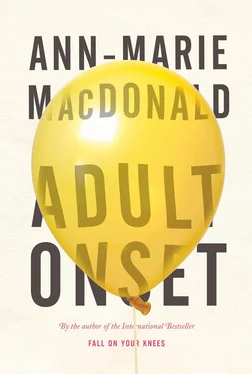•
She wakes up. They have kept her in. Moved her to a different floor — a quieter ward. Something is in the room and taking up space, a presence … it knows something about her … She falls back asleep.
She wakes up. Through her half-open door she sees tinsel decking the corridor … It was a boy. He is dead.
•
It is downright balmy as she pushes Maggie in the stroller with Daisy trotting alongside, off to pick up Matthew in time for lunch. The last crusts of brown ice are trickling into storm sewers, while overhead, trees are tight with buds; every year she promises herself she will catch the moment when they open and every year she is taken by surprise when the city is suddenly in full leaf. Sounds of traffic bulge as they near the intersection with busy Bathurst Street, but as they arrive at the lights in front of the corner store, strains of Albinoni’s stately Adagio bathe them along with the plants that the owner is placing outside on racks.
“Hello.” The lady almost sings it. “How are you?”
“Hi, Winnie.”
The music and plants create a buffer between the sidewalk and gritty Bathurst Street and as she waits for the lights to change, Mary Rose is held in a bubble of time, puffy and soft. No sooner has she turned her face to the sun, however, than she experiences a pang. She ought to phone her mother right now and just plain listen while the old darling loops on. Her mother has taken to talking about the lost babies, repeating stock phrases — Mary Rose noticed it last summer, and more recently when her parents visited in early January. Perhaps it is a feature of aging; tightly packed cargo from the past coming loose, sliding about below decks, making itself felt after decades — Mary Rose could understand if her mother’s need to tell and retell were evidence of a grief deferred. But what is disconcerting, even eerie, is the degree of animation that has crept into Dolly’s accounts. She tells them almost as if they were funny stories.
She never recollects the events in reliable order and neither does Duncan with his steel-trap mind. At the mention of Alexander’s name, there ensues a customary muddled working back through time in an effort to determine whether Dolly’s mother died before or after he was born, and how many days he lived, was it eight? Three? … As though it had all happened in wartime and, after the bombs had fallen and the sirens were stilled, fragments of events had been put back together in the wrong order, with gaps.
The light turns green and they push off — she coughs and feels a sudden kink in her throat — she mustn’t get sick until Hil gets home. The stroller grinds to a halt in the middle of the intersection where cars are paused like snorting horses at the lights. Maggie has managed to kick off one of her boots, which is now lodged in the undercarriage. Mary Rose bends to retrieve it, sustains a sandpapery smooch from Daisy and rises in time to avoid being run over by some idiot in a Smart Car.
“Back off!” she bellows.
Already repenting the adrenal expenditure, she shepherds them to the other side of Bathurst.
She is uncertain how many “others” there were, but she does know, thanks to Maureen, that one of them went down the toilet in Kingston. Their house was new and therefore, she told herself, unhaunted. Although who is to say an embryo is not robust enough to haunt a house — even a suburban split-level? It had a soul, according to the Church. And yet that soul was not welcome in Heaven any more than Other Mary Rose’s had been. What did God do with all those souls in Limbo? Were they recycled? Harvested like stem souls, capable of conferring immortality? Heroes often enter the Underworld in quest of a lost soul, but Mary Rose cannot think of any who have entered Limbo—“The Other Place”—for the same purpose. She ought to make a note of this. For the third novel.
She’ll jot it down later, they’re at the school. And there is her beautiful boy, lined up with his classmates on the other side of the glass door, waiting to be dismissed. Waiting to run to her.
•
She does not remember her husband having brought it, but it is sitting open on her bedside stand: a grey velvet jewellery box. In it is a ring. Milky blue, hint of iridescence, a moonstone. The box is open, so she must have opened it. This keeps happening. It is as though she opens her eyes on a scene from a movie, then the movie skips, sometimes backwards sometimes forwards. It is difficult to get hold of the story. In between the bits the screen goes black. This is probably due to the drugs they are giving her. Why are they giving her drugs? She is not sick.
This is her second time on this ward, she was here after she had Mary Rose — the second Mary Rose, the one who lived. She is not crazy, she knows this is Germany not Winnipeg, she knows it is Christmas. The ring in the box is blue. Like a stillborn baby. This baby wasn’t stillborn though, so why has he given her a stillborn ring? This baby was born alive. She heard him cry. They did not let her hold him—“Best not to,” they said. They took him away and called a priest.
She opens her eyes. Her husband is here, sitting by her bed behind a newspaper. He is in his uniform, he must have come from work. The ring is now on her hand.
“It’s pretty,” she says.
He looks up. “So are you.” He rises and leans down to kiss her on the forehead.
Her face is wet. This keeps happening. She squeezes his hand so he won’t worry. He looks thin. “Who’s feeding you?”
“Armgaard.”
She lets out a dismissive puff of air through dry lips.
“And Eileen and those gals have been around,” he adds. “They brought a stew. Wasn’t as good as yours, though.” He smiles. “And don’t worry about the baby, she’s fine.”
It takes her a moment to understand that he means Mary Rose, who is, after all, still the “baby” of the family — the baby at home, not the one in the morgue. He closes his hand around hers and she feels the ring bite against the neighbouring fingers. He is so good to her.
When she wakes up, it is dark and he is gone.
•
It is five o’clock: witching hour for children and puppies, who tend to go rangy around then, bitching hour for those returning home from work, worry-and-wander hour for old folks suffering from sundowning. It is the primal tilt between day and night that strikes low-grade dread into the heart of Homo sapiens , a holdover from the time when we were prey. It is why cocktail hour was invented.
Mary Rose is successfully negotiating a cocktail-free hour, blowing bubbles in the front yard for Maggie and Daisy who lunge and snap joyously while Matthew draws calmly with chalk on the flagstones. His flaxen hair falls across his serious blue eyes as he outlines a car, a dinosaur … His ability to focus goes with a strong, well-coordinated little body and lends his demeanour a degree of maturity beyond his five years. Before leaving to pick him up, Mary Rose attempted to restore the fractal tracks and to situate Percy, Thomas, Annabel and the others amid the possibilities, but he smelled a rat. “It’s not the same,” he pronounced gravely. She considered telling him the trains had come alive and rearranged things on their own. Would he buy it? Would it be wrong? “I’m afraid Maggie was playing with your train set, Matthew.”
She braced herself, but he was philosophical. Even indulgent. “Oh, Maggie,” he said. “She’s still a baby.”
So it is with a sense of her tranquility being ruffled, like a glassy lake by a finger of wind at dusk, that she watches her brother, Andy-Patrick, pull up in a shiny new BMW. He is not a frequent visitor — likely to drop by only when the interval between girlfriends becomes a drought of more than a few days or, more recently, whenever he renews his resolution to remain faithful to his fiancée, Shereen, who is often away in the course of her job as a drug pusher. Pharmaceutical sales rep. Mary Rose tends to get worked up when obliging Andy-Patrick with a sisterly lecture as to his shortcomings. Like a ringside coach, patching him up, sending him back in, “get up off the couch, listen to her without trying to fix her, change your sweatpants.”
Читать дальше












